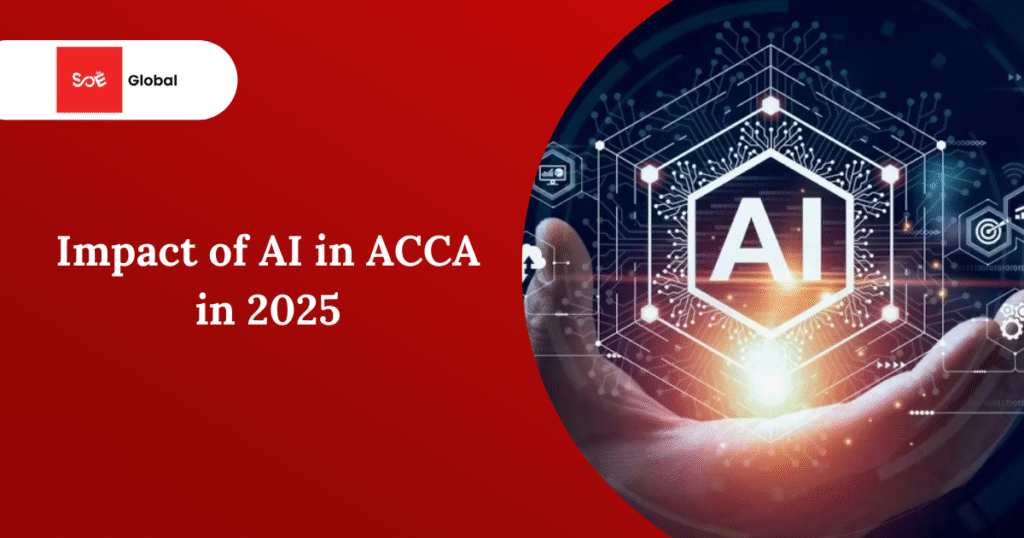As we step into 2025, artificial intelligence is no longer just a buzzword, it’s a transformative force reshaping industries across the globe. According to a 2024 ACCA report, 65% of finance professionals believe that AI will significantly change the nature of their roles within the next five years. This brings us to a pivotal question: What is the impact of AI in ACCA, and how can today’s aspiring accountants stay ahead?
In this blog, we’ll break down:
- The evolving role of AI in the accounting field
- The impact of AI in ACCA in 2025 and beyond
- The emerging skills ACCA students need to stay competitive
- How SOE Global is preparing future-ready professionals
- Career opportunities and how to future-proof your ACCA journey
The Rise of AI in Accounting
The financial industry is experiencing a digital overhaul. With the rise of AI tools like automation, machine learning, and predictive analytics, accounting is becoming more efficient and complex. Tasks like transaction processing, auditing, and risk analysis that once took hours are now performed in minutes by intelligent systems.
But rather than making accountants obsolete, AI is redefining their roles. Professionals are now expected to interpret data, provide insights, and make strategic decisions, all tasks that demand human judgment. The impact of AI in ACCA has made the qualification more dynamic than ever, requiring not just technical expertise but digital intelligence.
What Is the Impact of AI in ACCA?
Let’s explore how the ACCA curriculum and the profession are being shaped by AI:
- Automation of Routine Tasks
Basic bookkeeping, data entry, and reconciliations are increasingly automated. This means ACCA professionals can focus on high-value tasks like analysis and decision-making. - New Ethical Challenges
With AI tools making decisions, ethics and governance are even more critical. ACCA students now need to understand how to question algorithms and ensure compliance. - Advanced Audit Techniques
AI enables real-time audit procedures, anomaly detection, and better risk assessment. As a result, ACCA-qualified auditors must be well-versed in using AI-enabled audit tools. - Data Analytics Integration
The ACCA syllabus now integrates data analytics training. Understanding how to interpret dashboards, visualisations, and datasets is essential in 2025. - Upskilling is Non-Negotiable
As AI becomes mainstream, continuous learning becomes essential. The impact of AI in ACCA isn’t just in what you study, it’s in how you apply it.
According to a study, ACCA professionals proficient in AI tools are expected to have a 25% higher chance of employability in senior financial roles over the next 3 years.
AI Tools Every ACCA Student Should Start Exploring
To stay ahead of the curve and truly understand the impact of AI in ACCA, students can start familiarizing themselves with industry-relevant tools that are shaping modern finance. Platforms like Microsoft Power BI and Tableau are widely used for financial data visualization, while Alteryx and Excel with advanced functions (like Power Query and Macros) can help automate data processes. Tools like Xero and QuickBooks Online have begun integrating AI for real-time insights and predictive accounting. Students looking to dig deeper into automation can explore UiPath for robotic process automation (RPA), and even basic Python for finance through platforms like Coursera or edX. Starting early with these tools not only builds your technical edge but positions you as a future-ready ACCA professional.
AI-Driven Roles for ACCA Professionals
With the rise of AI, a new breed of finance roles is emerging:
- AI-Enabled Auditor
- Financial Data Analyst
- Automation Specialist
- Ethics & Compliance Consultant
- Digital Finance Strategist
This new era demands both ACCA knowledge and a strong grasp of tech tools like Power BI, Python for finance, and robotic process automation (RPA). The impact of AI in ACCA is clear, it’s pushing professionals to evolve into multi-skilled advisors.
How SOE Global is Leading the Change
As a Gold Approved Learning Partner, SOE Global has integrated tech-led modules, case studies, and mock sessions that reflect real-world industry changes, including the rise of AI in finance.
Why SOE Global stands out:
- Live discussions on AI and digital finance trends and events like Ace-Up Summit to interact with like minded people.
- Access to faculty with Big 4 and AI-audit experience
- Flexible self-paced and guided learning paths
- Placement support with companies that are leading digital transformation
Future-Proofing Your ACCA Journey
The impact of AI in ACCA means that students need more than academic excellence, they need digital curiosity, a growth mindset, and real-world exposure. Here are a few steps to stay ahead:
- Stay updated with AI advancements in finance through platforms like ACCA Global, Harvard Business Review, and LinkedIn
- Take electives or certifications in Data Analytics, FinTech, and Python
- Practice AI-based tools in internships and entry-level roles
- Choose a coaching center like SOE Global that prepares you for both exams and your future job
ACCA in the Age of AI
The impact of AI in ACCA is only beginning to unfold. As automation reshapes the accounting world, those who embrace it will lead the next generation of finance.
If you’re preparing for a career in accounting, now’s the time to choose a learning partner who goes beyond the basics. SOE Global doesn’t just help you pass ACCA, it prepares you for the finance world of tomorrow.
Ready to learn, adapt, and lead with ACCA in 2025?
Call +91 7358002200(Chennai); +91 8838207669(Coimbatore) or visit www.soeglobal.com to start your AI-smart ACCA journey today.
FAQs Related To Impact of AI in ACCA in 2025
What is the impact of AI in ACCA?
AI is transforming the accounting profession by automating routine tasks, increasing demand for analytical roles, and integrating new technologies into ACCA’s curriculum.
Will AI replace accountants?
No, AI will handle repetitive work, but human accountants will still be needed for judgment, ethics, strategy, and decision-making.
Is AI part of the ACCA syllabus?
Yes, recent updates to the syllabus include digital and data analytics modules to reflect the evolving role of accountants.
How does AI affect ACCA job opportunities?
AI opens up roles like AI-enabled auditor, data analyst, and digital finance strategist, increasing job variety for ACCA professionals.
How can I prepare for the impact of AI in ACCA?
Learn AI tools, take data analytics electives, and choose an institute that integrates tech training—like SOE Global.
Is coding required for ACCA professionals now?
While not mandatory, learning basic Python or Power BI is increasingly valuable for ACCA students in 2025.
How does SOE Global incorporate AI into ACCA coaching?
SOE Global uses AI-relevant case studies, expert mentors with digital experience, and offers placement with AI-driven firms.
Are AI skills essential for finance jobs now?
Yes, employers now look for professionals who can work with automation, data, and tech tools in finance.
What companies prefer ACCA professionals with AI knowledge?
Companies like Deloitte, EY, Amazon, and fintech startups actively hire ACCA professionals with AI awareness.
Can AI help in auditing and fraud detection?
Absolutely. AI tools assist in risk assessment, anomaly detection, and real-time data analysis in auditing.




